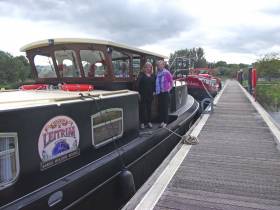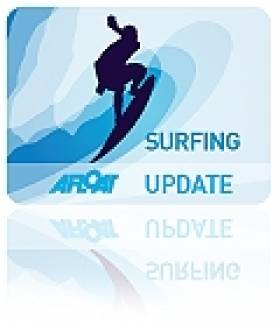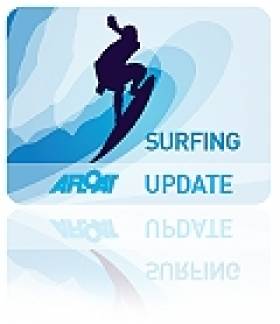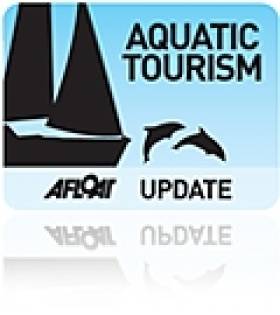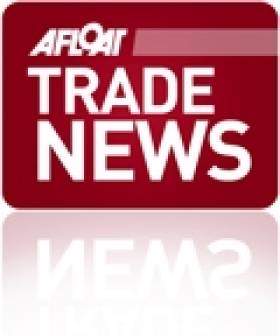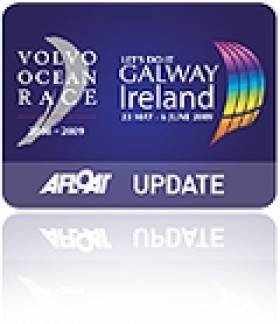Displaying items by tag: business
‘Boatel’ Among New Businesses On Ireland’s Inland Waterways
#InlandWaters - Waterways Ireland was on hand to welcome Mary McInerney and Jorgen Bjerknes’ new ‘boatel’ on arrival in Enniskillen earlier this week as part of their tour of the Erne System.
Based between Carrick-on-Shannon and Enniskillen, the married couple launched their converted barge Lovely Leitrim – which also operates as a private party venue and pop-up restaurant – in April this year, according to The Irish Times.
Lovely Leitrim is one of eight new businesses supported and licensed by Waterways Ireland in the past 12 months, a number that includes Water Taxi NI and Erne Boat Hire on the same waterways.
The other six start-ups are based on the River Shannon, the Shannon Erne Waterway and the Grand Canal.
Speaking on Monday 26 September, Waterways Ireland head of property Sinead Mallon said: “It's great to have welcomed two new businesses on the Erne system this year and we look forward to hearing from other entrepreneurs with their business ideas.”
Waterways Ireland invites people with new business ideas or existing business who wish to consider relocating to the Erne System to start discussions with the property and legal team by completing a Commercial Operating Licence form available online at www.waterwaysireland.org
Murphy's Victory Boosting The Profile Of Irish Sailing Says ISA Performance Chief
#ISA - Annalise Murphy's success in Rio is bringing the sport of sailing to "a much wider platform", according to the Irish Sailing Association's performance director.
Speaking to Bobby Kerr on Newstalk's Down to Business yesterday morning (Saturday 3 September), James O'Callaghan remarked on the sheer number of people of all ages who turned out for the Laser Radial silver medallist's homecoming in Dun Laoghaire.
"That's the first big change: all of a sudden we have a sports star," he said of Murphy, who was a guest on Friday's Late Late Show.
But beyond the media profile was talk of the business of getting her to sailing's elite level – thanks in great part to investment from Sport Ireland, investment that's focused on the sailing classes where Ireland can be most competitive.
O'Callaghan said taxpayer support is "exactly what's needed for Ireland to succeed on the international stage. But it's limited; the sport budget hasn't grown in the last four years."
As a result, private sponsorship – both of the ISA's programmes and individual sailors – remains a linchpin of the sport's funding, while the new Irish Sailing Foundation aims to attract the backing of philanthropists with a passion for Irish sporting success.
Listen to the whole interview below:
Ireland Sees Growth In Maritime Finance
#MaritimeFinance - As shipping companies are increasingly being forced to seek alternative sources of finance, is Ireland’s asset leasing hub the solution?
Ireland’s strength as a global hub for asset leasing is examined by tax advisors KPMG and legal firm Dillon Eustace in a recent report commissioned by the Irish Maritime Development Office (IMDO).
The report looks at Ireland’s advantages as a location for maritime commerce and how the rules and regulations which have supported the development of Ireland’s aviation sector translate to the maritime sector.
Recent Government activity to bring attention to the sector, via the annual Ocean Wealth Conference, is gaining momentum as interest in Ireland as a destination for maritime business grows.
Trends in maritime finance
Changing trends in maritime finance have been widely remarked upon in the media, with traditional lenders pulling back and some pulling out all together. An equilibrium has been reached, wherein ‘the new normal’ – those shipping banks who are still providing senior debt – are focused only on Tier One borrowers, leaving a continued void for senior debt provision to Tier Two borrowers.
These shifts in the market have opened demand for new forms of financing and increasingly we have seen private equity leaping to bridge that gap.
Ireland, with its beneficial tax structures and extensive asset finance experience, is well positioned to become the home of the new generation of finance solutions to the shipping industry. Many existing operators in the asset financing sector, previously focussed solely on aviation, have already diversified their asset base to include manufacturing equipment, medical devices, rail stock and are increasingly looking to maritime assets.
While there are notable differences in the nature of the asset class, perhaps most notably the volatility of the value of the asset and its cyclical nature, the beneficial structures and treatment available are unchanged. The Irish Government aims to attract more of this business and facilitate the growth of a thriving maritime finance sector in Ireland.
After a period of initial research of the opportunities, the IMDO commissioned KPMG and Dillon Eustace to collaborate on a report which is available HERE.
The report looks at Ireland’s overall offering for foreign direct investment and how that underpins the future development of maritime commerce in Ireland. It also examines the legal and tax conditions which have made Ireland a global leader in aviation financing and how that translates on the maritime side.
It highlights specific business, economic and tax based advantages, such as Ireland’s 12.5% corporation tax rate, supported by a stable and certain tax environment, as well as one of the most beneficial tonnage tax regimes in Europe.
The report also examines some of the success which Ireland has had in other industries, and how Ireland’s readily available skilled labour force, as well as being an English speaking member of the Eurozone and of the EU has helped that growth.
Aviation roots
Ireland has strong historic links with aviation and has established itself as a global hub for the aviation industry; it is the jurisdiction of choice for aviation finance and particularly for aircraft lease securitisation.
During the 1980s, Guinness Peat Aviation (GPA), based in Co Clare, became the world's largest commercial aircraft lessor. “The pool of expertise that emerged from GPA went on to establish Ireland as the world’s leading aviation leasing jurisdiction, with GPA’s legacy directors and staff going on to found what have become some of the biggest aircraft lessors in the world," says Jim Healy, director of shipping tax services with KPMG Ireland. "Indeed most significant transactions in the sector have involved Irish leasing companies. The industry looks set to grow further, with very large orders being placed by Irish lessors.”
Half of the top 50 leasing companies in the world are based in Ireland and more than half of the world’s leased aircraft are managed from here. It is this ready availability of the world’s leading experts in asset financing and securitisation, as well as the support structures in place which are the foundations of Ireland’s ambitions to create a global hub for maritime commerce.
Ireland is a leading issuer location for securitisation, a favoured location for asset ownership and the largest hedge fund domicile in Europe. Nearly €4 trillion assets are currently under administration in Ireland, according to the latest figures released by the Central Bank of Ireland and Irish Funds Industry Association. There are over 6,000 Irish domiciled funds alone and 36,000 finance professionals working in Dublin’s IFSC.
“Ireland has grown to be one of the world’s leading financial services centres,” says Lorcan Tiernan, partner in Dillon Eustace. “Irish professional advisors have been at the cutting edge of the most complex financial structures for many years and bring a broad range of transactional skills to the area of finance. As a group we comfortably navigate the most complex deals and offer innovative solutions across industries and all of these skills can and are being brought to bear in the area of maritime commerce.”
Demand-led developments
The IMDO carried out a programme of engagement in Asia in September, sponsoring the Marine Money conference in Singapore and launching the ‘Ship Finance: Opportunities for the International Shipping Industry’ report at a complementary event.
There was high demand for the event, with over 90 registered delegates and significant interest in the latest developments in the Irish market.
Speakers at this and its sister event in Hong Kong included Standard Chartered’s Nigel Anton, Ardmore Shipping’s Mark Cameron and Conor Warde of Clyde & Co. Both Standard Chartered and Ardmore Shipping have significant operations in Ireland, alongside a variety of maritime names such as d’Amico Shipping, Moore Stephens, the Denholm Group, Liebherr and Peninsula Petroleum.
The event in Singapore was sponsored by Bank of Ireland and CJC Law, both of whom presented. Speaking at the event, the IMDO’s director Liam Lacey outlined some of the measures already taken by government and some of those envisaged to further support and develop the industry, adding that “Ireland is a stable, English speaking, European jurisdiction with ambitious maritime plans, and we are ideally placed to meet growing demands from the Industry for stability and certainty. It is a truly exciting time to be involved in the industry in Ireland."
There is significant Government support and momentum for the development of the maritime sector in Ireland. The Government strategy for the sector is covered in a wider document published in 2012 called Harnessing Our Ocean Wealth (HOOW). A follow-up report released in June of this year details specific projects which will allow Ireland to meet ambitious targets laid out as part of HOOW, including doubling the Sectors’ contribution to GDP by 2030.
Those initiatives in the maritime space include the creation of an ocean yacht racing hub, the construction of an International Shipping Services Centre and specific recommendations to create a responsive regulatory environment and a dedicated body with the responsibility for the development of the entire sector.
What now?
Ireland has one of the most competitive tonnage tax regimes in Europe, a globally leading financial services industry and significant support from the Irish Government to develop the Maritime industry. So the only question for those who have yet to consider doing business in Ireland is 'why?'.
#Surfing - Two enterprising surfing brothers are one step closer to a £50,000 business grant from Virgin boss Richard Branson.
According to the Belfast Telegraph, Ricky and Chris Martin secured enough votes through the online 'Pitch to Rich' campaign to come first out of 897 businesses in the initial round.
And if they make it through to the final, they could present their Skunk Works Surfboards company to Branson himself, with the chance to persuade him to back their idea.
The Portrush brothers were profiled earlier this year for making the most of Ireland's growing thirst for surfing with their key concept - a custom method for manufacturing much more durable foam surfboards, or 'foamies'.
Already the duo have a manufacturing set-up in place and orders for 200 boards on the books.
But Ricky Martin, who also owns the Alive Surf School in Portrush, says pitching to Branson "could ultimately change how we do things".
The Belfast Telegraph has more on the story HERE.
Portrush Brothers Pioneer 'Next Generation' Surfboards
#Surfing - "Next generation" surfboards are the stock-in-trade of Portrush brothers Chris and Ricky Martin, whose Skunk Works business gets The Irish Times profile treatment this week.
The brothers' company is a first for Northern Ireland, let alone its Coleraine base, but they're taking advantage of a growing thirst for surfing across the island's top surfing spots.
That's particularly strong on the North Antrim coast – home turf of big wave surfer Al Mennie – and the northwest, from Donegal to Sligo, where the biggest waves attract the best in the world.
And the Martins' revolutionary concept – a custom method of manufacturing stronger foam surfboards to withstand the rigours of the waves – is appealing far beyond the North, with the brothers fielding interest internationally from the industry's leading lights.
The Irish Times has much more on the story HERE.
Whale Watch Tour Firm Gets Digital Boost
#Business - A West Cork whale watching tour operator has been announced as the third winner of the Eircom Digital Boost initiative for 2013, as Business & Leadership reports.
Union Hall-based Whale Watch West Cork now has the opportunity to redesign its website, and also wins a strategy day with digital and marketing experts from the Eircom Expert Panel to provide consultation specific to their business, plus a place on the SureSkills Diploma in Digital Marketing and a telecoms package for one year, all to the value of €10,000.
Established by conservationist Nic Slocum, the small business is one of most popular operators in the region in an industry that has become a major tourism magnet since the Government declared our coastal waters as a whale and dolphin sanctuary in the early 1990s.
Operating the company for a decade, Slocum says his business "is currently 75% reliant on the internet so improving our online and social media presence is hugely important."
He added: "By having an up-to-the-minute digital strategy and a stronger online presence, we'll be in a much improved position to broaden our customer base and we are very excited about getting on with it now and implementing our new and improved global online strategy."
Gary Disley, marketing director with Eircom Business and a member of the Digital Boost Expert Panel, said that the Whale Watch West Cork team "have a huge passion for whale and dolphin conservation and know what whale watchers want. Winning Eircom’s Digital Boost will practically equip Nic and his crew to maximise their potential and help them build the business."
Digital Boost is Eircom’s initiative to help SME owners increase their digital presence and maximise their online potential. The scheme offers practical guidance and tips to boost online enterprise, and is to open to all small and medium business owners, with or without an online presence.
Local Stakeholders Voice Upset at Howth Parking Charge Plans
#Howth - A new website has been set up outlining opposition by local traders and stakeholders to proposals to charge for parking in Howth Harbour.
As previously reported on Afloat.ie, Dublin North East TD Tommy Broughan slammed the proposals by the Department of Agriculture, Food and the Marine as "crazy" and potentially devastating for Howth's marine and tourism businesses.
Some 500 parking space are available in Howth village, which Minister of State Jimmy Deenihan has argued are being predominantly used by park-and-ride commuters.
In response to a question from Deputy Broughan in late December, Marine Minister Simon Coveney added that "the volumes of traffic currently parking at the fishery harbour, both during the working week and at weekends, are creating significant health and safety risks, to the extent that on some occasions access for emergency service vehicles is compromised."
At a meeting called by the Howth Chamber of Commerce on Monday 28 January, Howth Yacht Club Commodore Breda Dillon rejected that assessment, claiming that overcrowding was not an issue, and that on normal days there was only 10% occupancy of parking spaces on the middle pier.
Her sentiments were echoed by the majority in attendance, with area TDs and representatives of local business all referencing the potentially damaging effects that parking charges would have on the village economy. Click HERE for more on the story.
Business Booming for Kinsale Couple's Dive Boat Enterprise
#DIVING - The Sunday Independent recently highlighted a SCUBA cruise business in Kinsale that's going from strength to strength.
Scuba Addicts was set up by husband-and-wife team Graham and Anne Ferguson in the summer of 2009, initially on a whim after both lost their jobs when the credit crunch bit down hard.
Using their redundancy packages and a grant from the West Coast Development Partnership, they were able to purchase the boat they now use to take diving enthusiasts offshore.
And business is booming, with some 300 divers using their service in 2011 alone to explore coastal shipwrecks such as the infamous gun-running ship The Aud and the recently discovered German U-boat in Cork Harbour.
"We are making a big drive into Dutch, Belgian and German markets this year," says Anne. "There is huge potential for dive tourism from this area."
Viking Marine Weathering Storm of Economic Downturn
#ONLINE RETAIL - If Viking Marine boss Ian O'Meara has any regrets, it's that he didn't get into online trade much sooner.
In an recent interview with The Sunday Times' Sandra O'Connell, the 52-year-old managing director explains how the internet has provided him with a low-cost opportunity to diversify his business in these recessionary times.
Aside from retail outlets at The Pavillion in Dun Laoghaire and Kilcoole in Co Wicklow, both serving the vibrant east coast sailing community, the company now has Quickropes.com which provides hundreds of different ropes for any need - not exclusively boating.
"We thought there might be a market there for a specialist site, and it turns out there is," says O'Meara. "It's early days, but it's tipping along nicely."
It makes a refereshing change from the usual trend from losing custom in its brick-and-mortar outlets to the web, with the perception being that prices for everything are cheaper online.
"All too often we get people who come in to try on clothing items for size, only because they want to go and order them online," he says.
Another challenge brought by the internet is the expectation of the variety of stock Viking Marine is expected to carry. "We sell everything from a needle to an anchor," says O'Meara. "When people come in for something, they expect to find it."
But it appears the business is weathering both the choppy waves of the changing marketplace and the storm of the global financial crisis, thanks to some difficult but necessary sail trimming.
"In any case, I'm a sailor," he says, "it's what I do, it's what I love, and the business is still very much a part of that passion."
The Sunday Times has more on the story HERE (subscription required).
#VOLVO OCEAN RACE - Local businesses in Galway have committed to Fáilte Ireland's Quality, Value and Service charter for the Volvo Ocean Race festival that kicks off this weekend.
According to the Galway Advertiser, shops, eateries and accommodation throughout Galway have agreed to maintain high standards of quality and be transparent in their pricing to guarantee an enjoyable experience for the thousands of visitors who will be thronging the city over the next few days.
Minister for Tourism Leo Varadkar said the so-called 'Galway Guarantee' is "a great initiative to ensure that anyone visiting [the VOR] has a great time, and hopefully decides to return.”
The charter is a cornerstone of the ‘Your Volvo - Your Opportunity’ initiative designed to ensure that the City of the Tribes makes the most of the eight-day festival of sailing, culture, arts and food.
The Galway Advertiser has more on the story HERE.



























